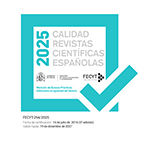Musikalische Leiden und Freuden de Ludwig Tieck: El fin de la utopía romántica
Resumen
When Ludwig Tieck writes his Musikalische Leiden und Freuden in 1822, it is long since he has left behind his period as an early romantic. Nevertheless, with this work he retrieves his initial premises and revises them in a critical way; he settles his account with the musical aesthetics, an account that goes back to his earliest work, specially to «Das merkwürdige musikalische Leben des Tonkünstlers Joseph Berglinger». This Novelle responds to questions raised more than twenty years before, matters concerning the practice and the musical reception, the artistic creation, the role of the artist and the possibility of an autonomous art that only serves itself. Twenty-five years after the creation of Berglinger, considered the first romantic artist in literature, Tieck believes now to have found the true romantic artist, less idealistic and more pragmatic.Descargas
Descarga artículo
Licencia
La Revista de Filología Alemana, para fomentar el intercambio global del conocimiento, facilita el acceso sin restricciones a sus contenidos desde el momento de su publicación en la presente edición electrónica, y por eso es una revista de acceso abierto. Los originales publicados en esta revista son propiedad de la Universidad Complutense de Madrid y es obligatorio citar su procedencia en cualquier reproducción total o parcial. Todos los contenidos se distribuyen bajo una licencia de uso y distribución Creative Commons Reconocimiento 4.0 (CC BY 4.0). Esta circunstancia ha de hacerse constar expresamente de esta forma cuando sea necesario. Puede consultar la versión informativa y el texto legal de la licencia.










